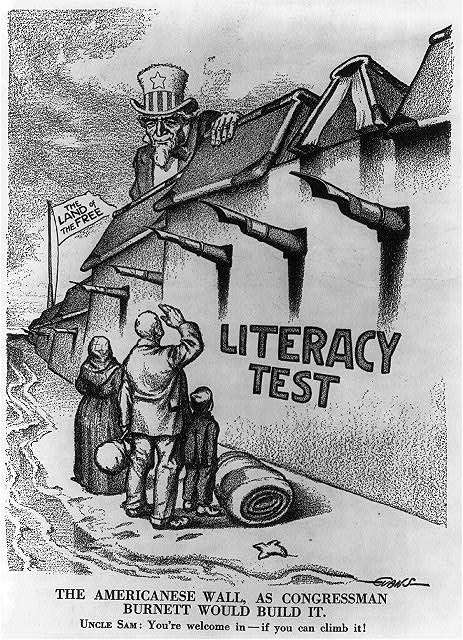How has US Immigration Policy been Criticized over Time?
| ✅ Paper Type: Free Essay | ✅ Subject: Social Policy |
| ✅ Wordcount: 2589 words | ✅ Published: 07 Sep 2017 |
Directions: How has US immigration policy been criticized over time? Students need to consider public challenges to immigration policy. Write a paragraph using evidence from the sources that compares and contrasts the arguments made in opposition to three historical approaches to immigration policy.
Use the Venn diagram to help organize your information
Students will examine the actual legislation behind the three actions taken around immigration.
Sources Used:
Source A: Political cartoon, “The Americanese Wall-as Congressman Burnett Would Build It”
Source B: Excerpt from a speech by Meyer Jacobstein
Source C: “1965 Immigration Law Changed Face of America”






|
Criticisms |
||
|
Source A |
Source B |
Source C |
List the criticisms of each immigration policy before writing your one page paper
|
Featured Source |
Source A: Raymond O. Evans, cartoon, “The Americanese Wall-as Congressman [John Lawson] Burnett Would Build It,” Puck, March 25, 1916 |

Public domain. Available from the Library of Congress: http://www.loc.gov/pictures/resource/cph.3b00563/.
|
Featured Source |
Source B: Senator Meyer Jacobstein of New York, congressional speech arguing against immigration restrictions, Congressional Record (excerpt),1924 |
Perhaps the chief argument expressed or implied by those favoring the Johnson bill [the Immigration Act of 1924] is that the new immigrant is not of a type that can be assimilated or that he will not carry on the best traditions of the founders of our Nation, but, on the contrary, is likely to fill our jails, our almshouses, and other institutions that impose a great tax burden on the Nation.
Based on this prejudice and dislike, there has grown up an almost fanatical anti-immigration sentiment. But this charge against the newcomers is denied, and substantial evidence has been brought to prove that they do not furnish a disproportionate share of the inmates of these institutions.
One of the purposes in shifting to the 1890 census is to reduce the number of undesirables and defectives in our institutions. In fact, this aspect of the question must have made a very deep impression on the committee because it crops out on every occasion. The committee has unquestionably been influenced by the conclusions drawn from a study made by Dr. Laughlin.
This is not the first time in American history that such an anti-foreign hysteria has swept the country. Reread your American histories. Go back and glance through McMaster’s History of the United States covering the years from 1820 to 1850. You will find there many pages devoted to the “100 per centers” of that time. So strange was the movement against the foreigner in those decades before the Civil War that a national political party, the “Know-Nothing Party,” sought to ride into power on the crest of this fanatical wave.
In those early days, however, the anti-foreign movement, strangely enough, was directed against the very people whom we now seek to prefer-the English, the Irish, and the Germans. The calamity howlers of a century ago prophesied that these foreigners would drag our Nation to destruction.
The trouble is that the committee is suffering from a delusion. It is carried away with the belief that there is such a thing as a Nordic race which possesses all the virtues, and in like manner creates the fiction of an inferior group of peoples, for which no name has been invented.
Nothing is more un-American. Nothing could be more dangerous, in a land the Constitution of which says that all men are created equal, than to write into our law a theory which puts one race above another, which stamps one group of people as superior and another as inferior. The fact that it is camouflaged in a maze of statistics will not protect this Nation from the evil consequences of such an unscientific, un-American, wicked philosophy.
Public domain. Congressional Record, 1924.
|
Featured Source |
Source C: Jennifer Ludden, transcript of All Things Considered program about immigration policy, “1965 Immigration Law Changed Face of America” National Public Radio, May 9, 2006 |
NOTE: Students should listen to the piece online at http://www.npr.org/templates/story/story.php?storyId=5391395.
Transcript:
1965 Immigration Law Changed Face of America
May 09, 2006
MICHELE NORRIS, Host:
From NPR News, this is ALL THINGS CONSIDERED. I’m Michele Norris.
ROBERT SIEGEL, Host:
And I’m Robert Siegel.
As Congress considers sweeping changes to immigration law, nearly all the debate has centered on the problem of illegal immigration. There’s been very little talk about the concerns of legal immigrants, the estimated three to four million people who are, as it’s often said, already standing in line.
NORRIS: Today we’re going to begin a three-part series about the process of immigrating to the U.S. legally. First, we’re going to step back and look at the history of our immigration law. The current system dates to 1965. It marked a radical break with previous policy and has led to profound demographic changes. As NPR’s Jennifer Ludden reports, that’s not how the law was seen when it was passed.
JENNIFER LUDDEN: This is the kind of rally that was taking place back then.
(SOUNDBITE OF CIVIL RIGHTS RALLY)
LUDDEN: At the height of the Civil Rights movement, equality, democracy, freedom were the ideas that seized the nation. And against them, the way the United States decided which foreigners could and could not enter the country became an increasing embarrassment.
STEPHEN KLINEBERG: I mean, the law was just unbelievable in its clarity of racism.
LUDDEN: Stephen Klineberg is a sociologist at Rice University.
KLINEBERG: It declared that Northern Europeans are a superior subspecies of the white race. The Nordics were superior to the Alpines, who in turn were superior to the Mediterraneans, and all of them were superior to the Jews and the Asians.
LUDDEN: By the 1960s, Greeks, Poles, Portuguese and Italians were complaining that immigration quotas discriminated against them in favor of Western Europeans. The Democratic Party took up their cause, led by the new president. Here’s John F. Kennedy speaking to the Italian migration in June 1963.
JOHN F. KENNEDY: There are still a good many brothers and sisters of American citizens who are unable to get here, who may have preferences as members of families, but because of the maldistribution of quotas in the European area, we have this situation, which has become nearly intolerable.
LUDDEN: After Kennedy’s assassination, Congress passed and President Lyndon Johnson signed the Immigration and Nationality Services Act. It leveled the immigration playing field, giving a nearly equal shot to newcomers from every corner of the world. The ceremony was held at the foot of the symbolically powerful Statue of Liberty. But if cable TV networks had been there, they probably would not have broken in live. Here’s how President Johnson began his speech.
LYNDON JOHNSON: This bill that we will sign today is not a revolutionary bill. It does not affect the lives of millions. It will not reshape the structure of our daily lives or really add importantly to either our wealth or our power.
LUDDEN: Hearing that now, it is an amazing statement because it proved so wrong. So how could Johnson say that? Sociologist Klineberg says the government’s newfound sense of egalitarianism only went so far. The central purpose of the new immigration law was to reunite families.
KLINEBERG: So the Congress then said, well, nothing’s going to change, because we’re going to give preference to people who are already, who are related to people who are already here. Then it added another provision, if you were a professional of exceptional ability, if you have skills that are in demonstrably short supply, you, too, can come to the head of the line.
Congress was saying in its debates, we need to open the door for some more British doctors, some more German engineers. It never occurred to anyone, literally, that there were going to be African doctors, Indian engineers, Chinese computer programmers who’d be able, for the first time in the 20th century, to immigrate to America.
LUDDEN: In fact, expert after expert had testified before Congress that little would change. Secretary of State Dean Rusk repeatedly stressed the issue wasn’t the numbers. No more people were likely to come, it was simply the principle.
Listen to this reading of an exchange between Secretary Rusk and a skeptical Senator Sam Irvin, Democrat of North Carolina.
Unidentified Man #1: You have in India a lot of people who would like to get into this country, do you not?
Unidentified Man #2: We don’t have a long waiting list.
Man #1: It is because they haven’t been able to get in. Even with a bleak opportunity to get in, as they have, they have 150 applications for every visa that could be issued.
NORRIS: Yes, the present estimate, based upon the best information we can get, is there might be, say, 8,000 immigrants from India in the next five years. In other words, I don’t think we have a particular picture of a world situation where everybody is just straining to move to the United States.
OTIS GRAHAM: When I first started studying this, I thought, now they’re lying, because they want this thing to pass.
LUDDEN: But historian Otis Graham, professor emeritus of the University of California at Santa Barbara, changed his mind.
GRAHAM: I changed my mind because I’ve found, in the research that I’ve been able to do, that so many lobbyists that followed this issue, so many labor union executives that followed this issue, so many church people, so many of those involved said the same thing. So you find ignorance three feet deep. Maybe ignorance is the answer.
KAREN NARASAKI: I often wonder whether some of the people knew, but perhaps weren’t sharing that with other people. Because it would scare them.
LUDDEN: Karen Narasaki heads the Asian American Justice Center. She finds the 1965 immigration overhaul all the more extraordinary because there’s evidence it was not popular with the public.
NARASAKI: It was not what people were marching in the streets over in the 1960s. It was really a group of political elites who, I think, were trying to look into the future of the United States. And again, it was the issue of, are we going to be true to what we say our values are?
MARIAN SMITH: Well here you are in the CIS Historical Reference Library, our history office and library.
LUDDEN: Marian Smith is the historian for Citizenship and Immigration Services, one of the agencies that replaced the old INS. The files of documents here can be mundane, but the walls are framed with lovely older maps, population charts and demographic bar graphs.
SMITH: Apparently we had money back then to actually pay for these kind of color lithographs that would be printed each year.
LUDDEN: In 1965, the political elite on Capitol Hill may not have predicted a mass increase in immigration, but Marian Smith pulls out a little agency booklet from the 1966 that certainly did. It explains how each provision in the new law would lead to a rapid increase in applications, a big jump in workload and more and more so as word trickled out to those newly eligible to come. Smith says a lifetime of immigration backlogs had built up among America’s foreign-born minorities.
SMITH: And so, they will petition for their family members and they will petition for their family members. And whether we’re talking about immigrants from Asia, Latin America, Africa, all these portions of the world where there is a demand for immigration. After World War II and with the post colonial status of many of these places, the shifting populations, the ability sometimes for people now to join their family in America, that maybe the only reason wasn’t the inability to get a quota visa for the United States. Maybe they had trouble getting out before.
LUDDEN: There were other things no one could have predicted, how immigration from Europe dropped off because of lower birth rates and higher standards of living. How Africa imploded and wars and famine there and elsewhere produced waves of refugees. And then the millions of illegal immigrants.
But it’s the system of family-based immigration that’s driven this country’s profound demographic transformation. Over time, in a process critics call chain migration, entire families have reestablished themselves in the U.S. Historian Otis Graham thinks the policy has been a terrible mistake.
GRAHAM: Family reunification puts the decision as to who comes to America in the hands of foreigners. Those decisions are out of the hands of the Congress. They just set up a formula and its kinship. Frankly, it could be called nepotism.
LUDDEN: In fact, President Kennedy’s original proposal made skills-based migration the priority. But Graham says a broad lobby pushed for the greater emphasis on families. It included churches, ethnic groups whose members had family in the old country and the AFL-CIO. Graham says the union worried about competition from too many highly skilled newcomers.
For Karen Narasaki of the Asian American Justice Center, the family focus makes sense.
NARASAKI: If you think about families and, you know, if you think about the roles that, say, your parents play when you have children. And how they help you, you know, take care of the newborns and provide support for you or how your brothers and sisters in the Asian community, what often happens is brothers and sisters get together and they buy a home together. They pool their money and they buy a business together. And so it, you know, family is very important to not just the social, emotional wellbeing, but also the economic well being of these communities.
(SOUNDBITE OF NATURALIZATION CEREMONY)
LUDDEN: At a recent naturalization ceremony, 32 immigrants gather for their oath in the ornate rotunda of Washington’s National Archives. Of them, three are from Western Europe. The rest of those gaining citizenship here are overwhelmingly from Africa, Latin American and Asia. At a basement reception, the new citizens pose for pictures holding tiny American flags and a gift bag that includes a refrigerator magnet of the U.S. Constitution and an AT&T prepaid calling card. One older woman is radiant in her Sunday best with a broad-brimmed hat.
HANNAH INDOVISI: I’m from Nigeria. My name is Hannah Indovisi. And you know the meaning of Indovisi? It means life is first.
LUDDEN: And Indovisi was sponsored by her U.S. citizen son, Samuel.
SAMUEL INDOVISI: Everybody in the world – I don’t know if you know this – wants to come to the United States of America. All you need to do is go to the embassy, any embassy, and see long, long, long lines of people who want to come here.
LUDDEN: In fact, Indovisi has a long line of relatives still in Nigeria who’d love to come. It’s the same with a brand new citizen munching cookies nearby.
AMA BALI: My name is Ama Bali and I’m from Sudan. Yes, I have my parents. I have sisters. I have brothers. And I’m going to apply for them to come here soon. I hope so.
LUDDEN: Are they excited for that?
BALI: Definitely, definitely. I hope they will be here soon.
LUDDEN: It may not be soon at all though. The immigration system set up specifically to reunite families is so overwhelmed with applicants, relatives who wait their turn must endure being divided for years. That’s tomorrow’s story.
Used by permission of National Public Radio. http://www.npr.org/templates/story/story.php?storyId=5391395.
Cite This Work
To export a reference to this article please select a referencing stye below:
Related Services
View allDMCA / Removal Request
If you are the original writer of this essay and no longer wish to have your work published on UKEssays.com then please click the following link to email our support team:
Request essay removal



